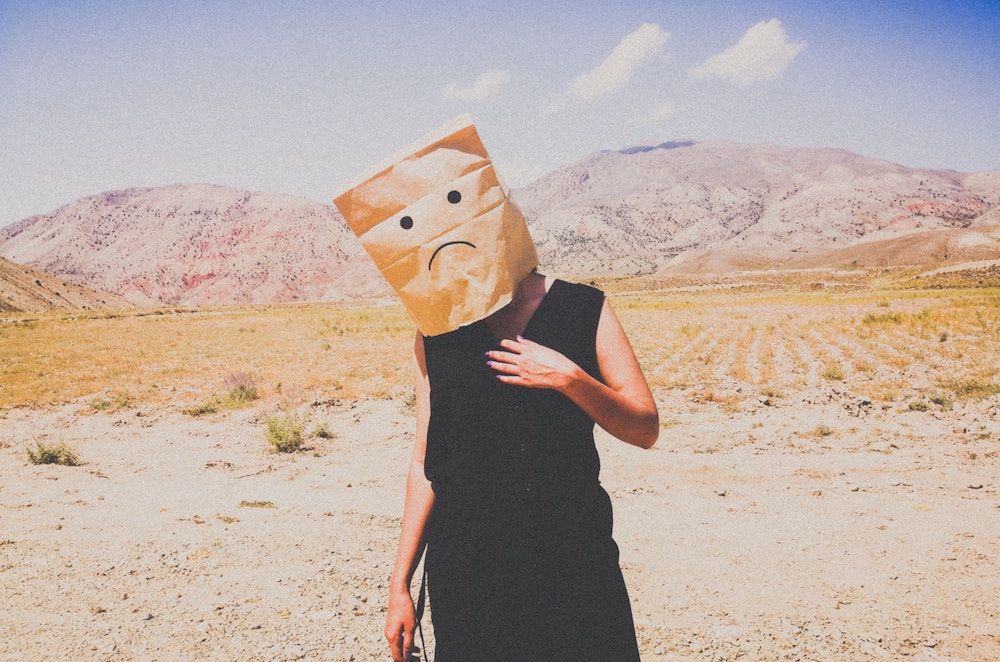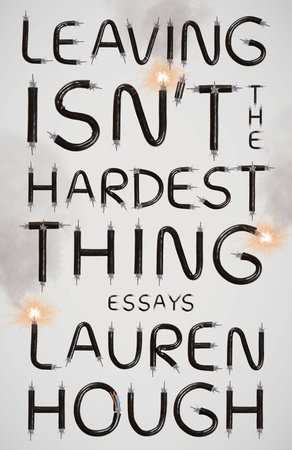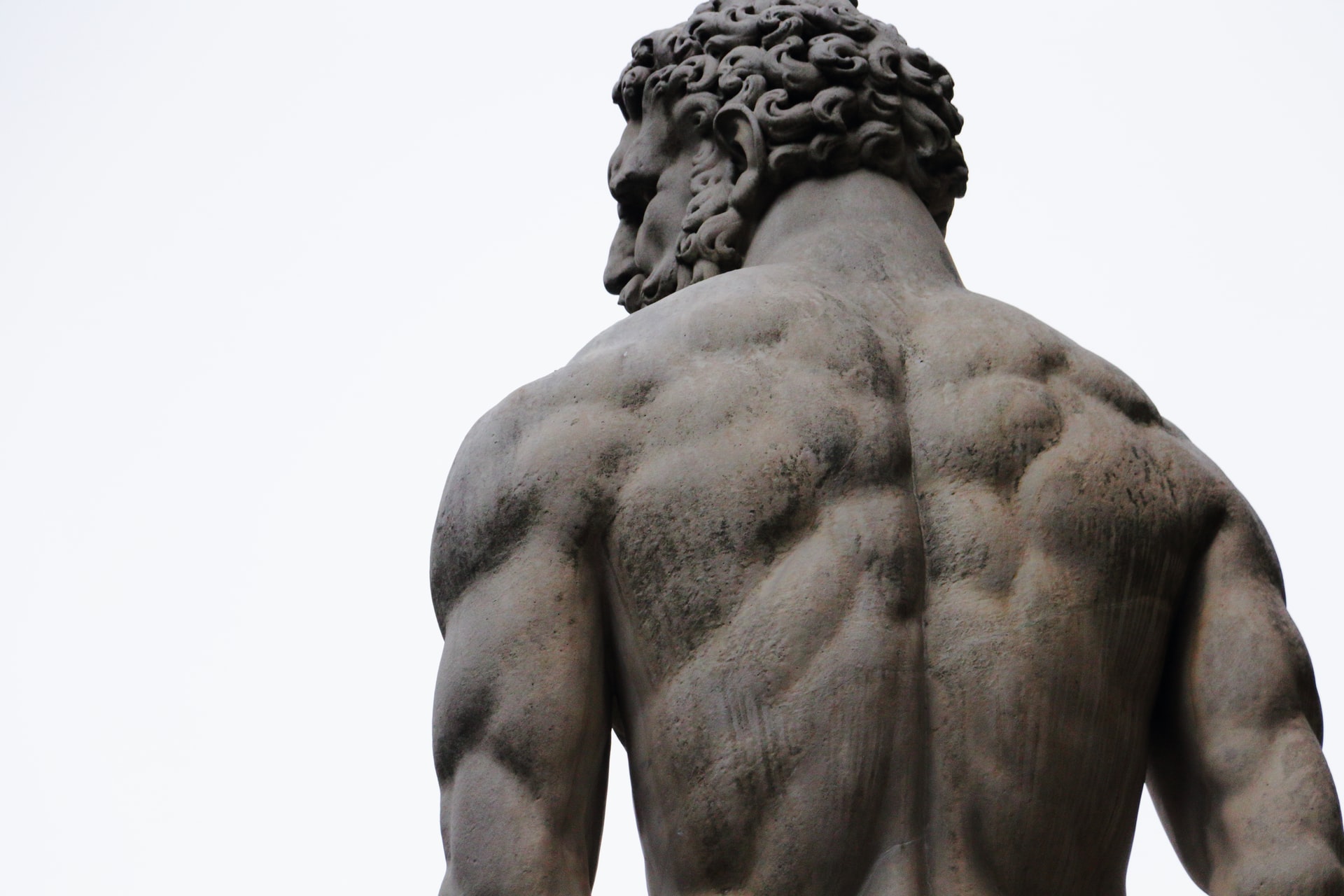interviews
Maybe Depression Is the Natural Reaction to a World Full of Pain
Lauren Hough, author of "Leaving Isn’t the Hardest Thing," on growing up in a cult, engaging in Twitter fights, and why we should hate people and move on

Lauren Hough grew up in The Family, an international doomsday cult that preached free sex as a means to bring you closer to God and corporeal punishment for difficult children—of which Hough was one. Often desperately poor, her parents dragged her from Chile to Argentina to Germany to Japan to Texas. After joining the Air Force, she was court-martialed for setting her own car on fire—and acquitted, as it wasn’t true. Shortly thereafter she was kicked out for being gay. After that, she found gigs as a bouncer in a gay club, a bartender, a barista, and a cable guy (she notably worked on the cable of Dick Cheney, to whom she made a quip about waterboarding). She’s lived out of her car, gotten into a few fistfights, spent time in jail, done a lot of drugs, and experienced her fair share of tumultuous romance. She’s also loved the hell out of her dog, Teddy, packing up her home in Texas and moving to Cape Cod because it was a better climate for his failing health.
In other words, Hough has been around the block. And has stared down misogyny, homophobia, and classism. Lucky for us, she’s here to tell about it.
Her collection of essays Leaving Isn’t the Hardest Thing is by turns vulnerable, outraged, riotously funny, heart-crushing, and hopeful. These bare-chested journeys into Hough’s life provide glimpses into worlds some will be familiar with, others not. Regardless, the emotional gut-punch will knock the wind out of you. But the sheer beauty of her unstinting tenderness for the world, despite the outrage, provides a new kind of solace.
Jane Ratcliffe: You write “sometimes what looks like depression is your brain slowing down enough to think” and “maybe depression’s the natural reaction to a world full of cruelty and pain.” We do seem to exhaust ourselves trying to be happy in this unstable world as if it’s our perceptions that are wrong, and not what’s actually happening.
Lauren Hough: You usually develop coping mechanisms with depression, and one is learning that your brain is lying to you; that things aren’t really that dark; and if you hold on, things will get better. But this year? It seems absurd to not be a little depressed about the world at large right now. And I think everybody’s experiencing the reality that is depression. We’re all in it. So weirdly I’ve been less depressed this year. I’ve talked to other people who have been battling depression for longer periods of time. Same. I think the coping mechanisms that you develop for depression have been useful, but at the same time… I’m not being very articulate here. Why wouldn’t you be depressed right now?
It seems absurd to not be a little depressed about the world at large right now. And I think everybody’s experiencing the reality that is depression. We’re all in it.
JR: Are you saying it’s almost a relief not to have to engage the coping mechanisms?
LH: Usually the societal demand is that no matter how depressed you are, you pretend to be all right. You pretend to be happy. And you get through your day. And that’s supposed to somehow help you. But, yeah, now there’s no pressure, you can just be depressed. It’s fine. You can not answer emails for a few days. Everyone gets it. We’re all starting emails with “I hope this email finds you… I just hope it finds you.”
JR: That’s how I start mine! You’re so good at articulating your despair and horror and fury and disappointment and it’s all so bang on. But all through the book I found myself wondering what gives Lauren hope. And does it counter any of the trauma you’ve lived through?
LH: It absolutely does. You really have two choices: you can have hope or you can have despair. With despair you can’t get out of bed, you can’t function, so you have to have hope. Where you find it? Hope is something I think you practice having. You work on it. It’s a physical effort sometimes to keep it. I think if you exercise it, if you fill your life when you can with the beauty that is in this world, then when you need it you hope it’ll be there
JR: You have this persona, in a certain way, of being such a hard ass. In fact, when I asked one of my friends if she had any questions for you she said, “No, she scares me.” Yet you strike me as so tender. I think you hold both. What you just said was tender and thoughtful. But then on Twitter, you are kind of this champion: you defend a lot of marginalized people, you speak truth to power, you take on a lot of bullies. And in return, you get a lot of abuse. I was surprised when I was reading your book to discover that you had spent so much of your life keeping yourself small and trying to dodge conflict. What changed? And are you really handling all the abuse that comes your way as well as you seem to be?
LH: It shocks me when people tell me I’m intimidating. But sure, we’re all a little braver online. That’s why people feel free to hurl weird abuse at me because I’m not standing in front of them. I know this is a ridiculous thing to say for someone who wrote a memoir, but I am a very private person. I am extremely sensitive. And, yeah, there have been days when the Twitter abuse made me cry and I had to shut off. But you learn to only look at it if you’re capable of laughing it off. If I’m feeling a little more touchy, I will not look at my mentions. You can pick a fight on Twitter, or one will come at you. And there’s sort of a demand that you stand there and take all of the abuse. If you go private, people think they won. But if they were standing on your lawn screaming at you, and you shut your door, that wouldn’t be a victory. That’s all it is, that sometimes you just have to shut the door and let them scream themselves out. They get bored and move on eventually.
Societal demand is that no matter how depressed you are, you pretend to be alright. You pretend to be happy. And that’s supposed to somehow help you.
At some point, I figured out there’s no point to having 60,000 followers if I wasn’t using that to try to help someone else. But I’m learning I need to start building a couple walls there and maybe not share everything because there’s a parasocial relationship that happens where people believe that they know you and they own you. They get very angry if you don’t match the expectation that they’ve built up you. They’ll see me make fun of a bully on Twitter and throw all manner of abuse at me and be shocked that it affects me. That I block them or lock the door. I don’t really understand the reaction I get from people entirely. I’m just being me. But just like you write a book and put it out in the world and have no idea how people are going to take it, what people are going to do with it. Once you let it loose, it becomes theirs.
JR: You swear a lot in your writing. What is it you love about that form of language?
LH: There are so many restrictions, especially on women’s speech. You’re told from the time you’re little to be more ladylike and speak softer. A lot of it developed in rebellion to that. I wasn’t going to speak more softly or edit the words that came out of my mouth. They’re useful words. I am absolutely sure I’m going to get Goodreads reviews that are solely about my profanity. I am really excited for them.
JR: You write:
“One thing I learned late in life is there are people who are shocked when bad things happen to them. More than that. They expect good things to happen. There are others who tell you to think positive thoughts and focus on something pretty and the universe will hand it to you…I’m not one of those people…I’ve learned, if not to expect the worst, to not be surprised by the worst.”
Positive thinking can seem woo-woo. But thinking negatively can be draining.
LH: That’s the journey of life really, figuring out the balance between what’s cynicism and what’s hope, and what’s protecting yourself and what’s closing yourself off. That’s why we’re all in therapy, right? What’s a wall and what’s a boundary?
JR: You have this unique lens through which to view Trump and QAnon. Could you talk about that?
LH: I don’t think we have the word for what’s happening. There was only so much of a reach for a cult before this. Unless you go back to Germany, but they weren’t sharing things on Facebook. There weren’t a thousand ways to get into it and a thousand recruiting methods. Yes, it’s cult-like. Yes, they get the same things that you get from a cult; they get the camaraderie and the brotherhood and feeling like they’re part of something and have a purpose. And the big-ticket item, thinking you have the secret to life.
But they don’t have to do anything for it. All they have to do is hit share on Facebook. They’ve done their part. You don’t have to go join a commune and you don’t have to give up everything you own. You don’t have to give your money to anybody even. Although I’m sure there are people who will take it. I don’t know that we have the vocabulary for this yet. It’s interesting, and terrifying. I know it’s providing the same high, but I don’t know where it ends. I don’t know what happens without Trump. Generally, when a cult leader dies off, it either becomes a religion or it disbands. I guess we’re about to find out.
JR: Do you feel like you’re reliving what you’ve already lived through?
LH: Yeah, every day. It is absolutely bizarre. I’m very proud that all we were in was a dumb little cult. And not storming a Capitol. It has been surreal to watch. How reasonably intelligent people buy into whatever the fuck this is. The recipe was there. It always has been in America. The desperation. Our lives revolve around work, and there’s no way to get ahead. And when someone offers you a golden ticket, it’s really easy to buy into that. We don’t have the sense of community we should. People just kind of live in the suburbs on their own. So someone comes and offers them a purpose and unconditional love and someone to blame for all their problems. It’s really easy to buy in. I’m stumped as anyone else.
JR: You write about the shame you experienced growing up, living out of your car, later getting kicked out of the military for being gay, and having to do whatever you needed to do to survive. You trained yourself to hide your emotions and smile and carry on. Firstly, you can articulate what you were ashamed of? Because, while it’s understandable, you weren’t actually causing anyone any harm in any of those situations. And secondly, can you speak to how shame can be used against people? Or possibly be beneficial?
There’s no way to get ahead. So someone comes and offers purpose and unconditional love and someone to blame for all their problems. It’s really easy to buy in.
LH: The great thing about shame as a motivator is it doesn’t really have to have a source. You can just install it by telling someone they’re supposed to be ashamed. You hear that enough and you start feeling it, internalize it. It’s the classic motivator of the abuser to perpetuate what they want to do. If you can get someone too ashamed to talk about it, they won’t talk about it, and you have control. Every religion that I know of uses shame as a control mechanism.
And shame has a place in society. We get into a whole lot of discussions about cancel culture, depending on who you are and how you want to word it. We used to just say, “that person’s an asshole. And they’re irrelevant.” They weren’t canceled; we’d all just agree they’re an asshole. So, yes, shame has its purpose in society. But anything that you use to control people can have bad side. Shame definitely has one.
JR: Do you still carry a lot of that shame that built up over the years?
LH: Nah.
JR: Oh, good!
LH: I don’t know when I lost that. I hang onto a little bit of it. I think writing about it helps. I liken it in the book to coming out of the closet and it’s pretty accurate. Once you come out it’s an almost instant release of that shame. It doesn’t survive the daylight.
JR: I love hearing that. Linked with that, I wondered what your thoughts were on forgiveness. If you feel like it’s necessary to heal or get to a better place in your life.
I’m hating like twelve people right now. It requires no energy whatsoever. I just hate them and move on with my day.
LH: It depends on if you want to keep someone in your life or not. If you want to have relationships with people, yes, you have to forgive because we all hurt each other, intentionally or not, constantly. We have a way of demanding forgiveness from people who have no reason to give it to us. I’m not a huge fan of it as a concept. I think if you love someone and you want to keep them in your life, you forgive them. And if you don’t, there’s no need to; you can just not deal with that person. And that’s fine, too.
JR: Do you feel like by not forgiving, it eats away at you in any way?
LH: Yeah, go on Instagram and there are hundreds of quotes about how hatred will eat your soul alive. But, I mean, I’m hating like twelve people right now. It requires no energy whatsoever. I just hate them and move on with my day. If you ask me about them it’s “yeah, I hate that fucker.” I think maybe it’s healthy for those of us who were taught you have to forgive everybody to learn to hold a little bit hatred in your heart because it keeps you from getting hurt again by that person. Like every other goddamn thing, there’s balance. And this is why we’re in therapy.
JR: Your essays are often laugh-out-loud funny yet you’re writing about such painful stuff. You write that this is a direct result of growing up in constant fear. What’s the connection between humor and fear?
LH: Humans are great that way. You can go through the saddest moment of your life and be laughing about it. The hardest I’ve probably laughed in the past year is when I was burying my dog. My nephew and I were discussing how to get the body out of the trunk in the back of my car. You know, is that the head and is that the feet and he might have pooped. He was wrapped in a blanket. We thought the person standing behind us was my niece. It was the pizza guy. Who took off. And that’s when we realized that we had just given a pizza guy a story about the time he showed up at a house and people were moving a body into a wheelbarrow. It’s still funny to me. It’s still funny that you can dig a grave in your backyard and your neighbor will come out and look and go right back inside.
We’re all just trying to hold it together.
I think humor is the way we learn to deal with things. I don’t know how you come out of that without a sense of humor and have any semblance of sanity or any hope whatsoever. You have to think it’s funny. And a lot of it is objectively funny. It’s a skill you develop. A defense mechanism, absolutely. It can get really grating if you’re trying to have an emotional moment with me and I’m cracking jokes. But it has its use. It releases tension. It gives you something to do with the pain until you figure out how to how to get rid of it.
JR: As you were writing about growing up in a cult and being kicked out the military and all these experiences, did you develop more tenderness for yourself?
LH: I think I developed more tenderness for other people. I was angrier when I started that book than when I finished it. There’s some argument I was having with a girlfriend at some point and in writing this scene—and it’s been a good 20 years where I’d been really damn sure who the asshole was in that situation—and it turns out it was me. I was completely fucking wrong. I hope she doesn’t read the book! I have more compassion for everyone involved, myself included. You know that morning where your aunts are like, “go play outside.” At some point you realize they were hungover as shit. That is a lot of noise that children make. You thought your parents were supposed to have answers; why the fuck would they, they were 20. We’re all just trying to hold it together. I think it takes a little bit of age to realize that your parents weren’t any different. Most of the people in your life weren’t any different. If someone is convinced they have all the answers, that’s not the first person you want to hang out with.









